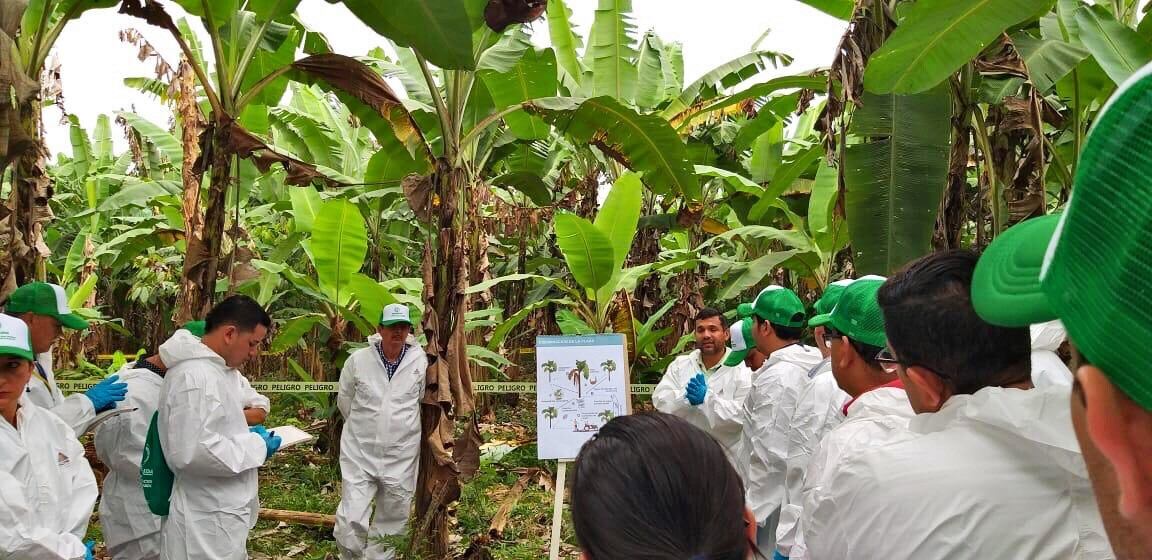Throughout Latin America and the Caribbean, bananas are both of significant nutritional and economic importance. Yet, their continuance is under threat due to a banana disease, called Banana Fusarium wilt.
To address the problem, the Food and Agriculture Organization of the United Nations (FAO) has implemented an emergency project under its Technical Cooperation Programme. The initiative has been launched to support countries in Latin America and the Caribbean to tackle the spread of Fusarium wilt, which can destroy the banana crops that millions of people depend upon.
What is causing the threat of banana disease?
Fazil Dusunceli, Agriculture Officer at FAO and Fenton Beed, Team Leader, Rural and Urban Farming Systems at FAO: Banana Fusarium wilt is a disease of banana caused by the fungus Fusarium oxysporum f.sp. cubense (abbreviated as Foc). Foc is soil-borne, infects banana plants through the roots and grows within the plant blocking the vascular tissues, causing wilting and then death of the infected plants.
Another race of Foc was a major threat to bananas previously in the last century leading to the replacement of the then common export variety Gros Michel with the Cavendish variety due to its resistance.
However, a new race of the fungus emerged 20 years ago called Tropical Race 4 (TR4). TR4 can infect Cavendish and other banana varieties and because Cavendish provides around half of global production and dominates international export markets, TR4 poses a grave concern.
What impact is the disease having on the Latin American and Caribbean populations?
Fazil Dusunceli and Fenton Beed: Latin American and the Caribbean grow and export Cavendish bananas and this industry generates significant wealth for the region. The current outbreak has been reported in one region of Colombia and the immediate impact is envisaged to be local with the most affected being the income of the producer and the workers.
The government and plant protection institutions have taken the necessary measures to put the affected area under quarantine with a view to containing the disease to prevent its spread. The regional impact depends on the effectiveness of these measures to stop the disease in Colombia and also to prevent further introductions of the fungus to other parts of Latin American and the Caribbean (also from other parts of the world).
Can you eradicate the threat of the disease entirely?
Fazil Dusunceli and Fenton Beed:
Complete eradication is not possible due to a number of challenges including:
- The fungus is soil borne and treatment of soils in large areas is challenging
- Fungicides decompose once they contact soil particles / organic matter and can have broad effects, also killing beneficial soil microorganisms
- The fungus can survive for long periods in the soil (reported to be for over two decades and in the absence of banana plants) and can re-infect bananas when next cultivated.
What plans are in place to address the threat?
Fazil Dusunceli and Fenton Beed: Once Foc TR4 is introduced and established in a location the only way of handling the situation is to destroy infected plants, quarantine the area (combined with digging ditches around to avoid the spread of the fungus through water movement / floods) with a view to contain the fungus where it is and prevent its spread.
While this may be difficult to apply in places where capacities are lacking, it is clear that Colombia is taking this situation very seriously and are actively increasing awareness and deploying resources to contain the disease.
World Food Day takes place on 16th October 2019. We asked FAO’s Fazil Dusunceli and Fenton Beed how World Food Day is supports these efforts?
Fazil Dusunceli and Fenton Beed: World Food Day is an opportunity to draw the attention of international and national communities to emerging food related issues. Thus, the WFD will be used to raise awareness in concerned countries regarding the importance of the disease and prevention, particularly in Colombia. Concerted efforts will be made in Colombia to create dissemination campaigns that are communicated to smallholder farmers regarding the implementation of biosecurity measures and strategies.
Beyond the WFD, FAO is helping the countries in the region through a recently launched regional Technical Cooperation Project on the topic targeting ten countries: Ecuador, Colombia, Panama, Dominican Republic, Guatemala, Dominica, Saint Lucia, Jamaica, Surinam, Trinidad and Tobago.
This project aims to assist the countries in the region with developing regional and national strategic and action plans to address the threat, together with capacity building efforts. Recently, two dedicated TR4 technical sessions have been organized during the regional workshops of the International Plant Protection Convention (IPPC) for Latin America and Caribbean in Colombia and Antigua and Barbuda respectively. These focused on awareness, preventive measures and preparedness for potential incursions.
At a global level, FAO has been using every opportunity to raise awareness of the topic to the international community. In this context, the topic will be brought to the attention of the participants at an event that will take place on 15th October 2019 during the 46th session of the Committee on Food Security (CFS) at FAO Headquarters in Rome. This event will highlight the importance of this disease and the collaborative work between FAO and CGIAR Centers, formally called the Consultative Group on International Agricultural Research.

